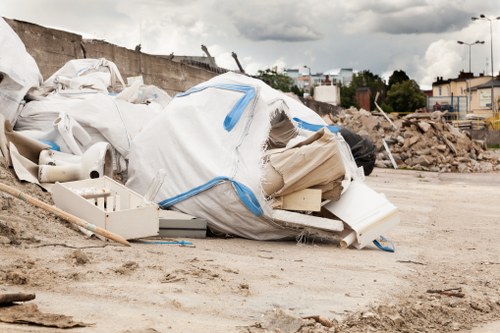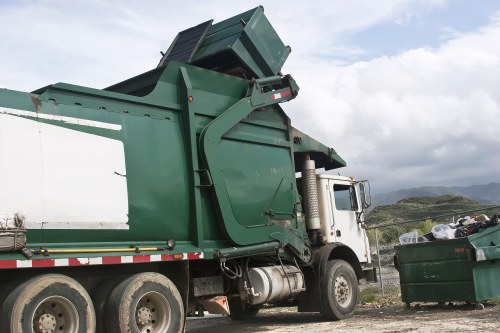Demolition Waste Removal in Chingford

Demolition projects in Chingford generate a significant amount of waste that requires efficient removal and disposal. Proper management of demolition waste is crucial for maintaining the area's cleanliness, ensuring safety, and adhering to environmental regulations.
Whether you're undertaking a residential renovation or a large-scale commercial demolition, understanding the best practices for waste removal can save you time, money, and reduce your environmental footprint.
In this comprehensive guide, we'll explore the key aspects of demolition waste removal in Chingford, including types of waste, removal processes, recycling opportunities, and choosing the right service provider.

Understanding Demolition Waste
Demolition waste encompasses all materials that are removed from a building during the demolition or renovation process. These materials can vary widely depending on the structure and the extent of the demolition.
Common types of demolition waste include:
- Concrete and masonry: These are among the most prevalent materials in demolition sites, often requiring specialized handling due to their weight and composition.
- Wood and timber: Salvageable wood can be recycled or repurposed, while treated wood may need special disposal methods.
- Metals: Steel, aluminum, and other metals can be recycled, reducing the need for new metal production.
- Brick and tile: These materials are often reused in new construction projects, promoting sustainability.
- Plastics and insulation: Proper disposal is essential to prevent environmental contamination.
Understanding the types of waste generated helps in planning the removal process effectively, ensuring that each material is handled appropriately.

The Demolition Waste Removal Process
1. Planning and Assessment
Before starting the demolition, a thorough assessment of the site is essential. This includes identifying the types and quantities of waste, potential hazards, and any materials that can be recycled or reused.
2. Sorting and Segregation
Sorting waste on-site helps in efficiently removing and recycling materials. Segregation ensures that recyclable materials are not mixed with non-recyclable waste, streamlining the disposal process.
3. Transportation
Once sorted, the waste needs to be transported to appropriate disposal or recycling facilities. Choosing the right transportation method is vital to minimize costs and environmental impact.
4. Disposal and Recycling
Partnering with reputable recycling centers in Chingford ensures that waste is disposed of responsibly. Recycling not only reduces landfill usage but also supports sustainable construction practices.
5. Site Cleanup
After waste removal, thorough site cleanup is necessary to ensure the area is safe and ready for future use or construction.

Recycling Opportunities in Chingford
Chingford offers several recycling opportunities for demolition waste, promoting environmental sustainability and reducing the community’s carbon footprint.
- Concrete Recycling: Concrete can be crushed and reused as aggregate for new construction projects.
- Metal Recycling: Metals like steel and aluminum are highly recyclable and can be reused in various industries.
- Wood Repurposing: Salvaged wood can be used in new building projects, furniture making, or as biomass for energy production.
- Brick and Tile Reuse: Clean bricks and tiles can be repurposed in new construction, reducing the need for new materials.
- Plastic Waste Management: Proper recycling of plastics prevents environmental pollution and supports the production of new plastic products.
Embracing recycling not only benefits the environment but can also provide economic advantages by reducing disposal costs and generating revenue from recyclable materials.

Choosing the Right Demolition Waste Removal Service
Experience and Expertise
Selecting a service provider with extensive experience in demolition waste removal in Chingford ensures that the job is done efficiently and in compliance with local regulations.
Compliance and Permits
Ensure that the company adheres to all legal requirements, including obtaining necessary permits and following environmental guidelines for waste disposal.
Recycling Practices
Choose a service that prioritizes recycling and sustainable practices, helping to minimize the environmental impact of your demolition project.
Transparent Pricing
Transparent and competitive pricing is essential to avoid unexpected costs. Request detailed quotes and understand what services are included.
Customer Reviews and Reputation
Research customer reviews and the company's reputation in Chingford to ensure reliability and quality of service.
Benefits of Professional Demolition Waste Removal
Hiring professionals for demolition waste removal in Chingford offers numerous advantages:
- Time Efficiency: Experts can complete the removal process faster, minimizing project delays.
- Safety: Proper handling of hazardous materials ensures safety for workers and the community.
- Cost-Effectiveness: Efficient waste removal reduces overall project costs by minimizing delays and optimizing recycling.
- Environmental Responsibility: Professional services prioritize sustainable practices, contributing to environmental conservation.
- Regulatory Compliance: Ensures all local laws and regulations are met, avoiding legal complications.
Overall, professional demolition waste removal services provide peace of mind, ensuring that your project is handled responsibly and efficiently.
Environmental Impact of Improper Waste Removal
Failing to manage demolition waste properly can have severe environmental consequences:
- Landfill Overuse: Excessive waste leads to increased landfill usage, contributing to land degradation.
- Pollution: Hazardous materials can contaminate soil and water sources, posing risks to human health and wildlife.
- Resource Depletion: Not recycling materials leads to the unnecessary extraction of new resources, increasing environmental strain.
- Carbon Footprint: Inefficient waste management practices can elevate greenhouse gas emissions, exacerbating climate change.
By ensuring proper demolition waste removal, these environmental issues can be mitigated, fostering a healthier and more sustainable community.
Cost Factors in Demolition Waste Removal
The cost of demolition waste removal in Chingford can vary based on several factors:
- Volume of Waste: The quantity of waste directly influences disposal and transportation costs.
- Type of Materials: Specialized handling for hazardous or recyclable materials may incur additional fees.
- Accessibility: Difficult-to-access sites require more effort and resources, increasing costs.
- Location: Proximity to disposal or recycling facilities can affect transportation expenses.
- Service Level: Comprehensive services, including sorting and recycling, may be priced higher than basic removal.
Understanding these factors helps in budgeting effectively and choosing services that offer the best value for your specific needs.
Regulations and Compliance
Adhering to local regulations is essential for demolition waste removal in Chingford. Non-compliance can result in fines, project delays, and environmental harm.
- Waste Segregation: Regulations may require the separation of different waste types for proper disposal and recycling.
- Disposal Permits: Obtaining necessary permits ensures that waste is disposed of legally and responsibly.
- Hazardous Material Handling: Special protocols must be followed for the removal and disposal of hazardous materials like asbestos or lead-based paints.
- Recycling Mandates: Some jurisdictions mandate the recycling of certain materials, promoting environmental sustainability.
Working with knowledgeable demolition waste removal services ensures that all regulatory requirements are met, safeguarding your project’s success.
Innovations in Waste Removal Technology
The demolition industry in Chingford is leveraging advanced technologies to improve waste removal efficiency and sustainability.
Automated Sorting Systems
Automated technologies enhance the sorting process, increasing accuracy and speed in segregating recyclable materials from general waste.
Recycling Robotics
Robotic systems facilitate the separation of complex materials, reducing manual labor and improving recycling rates.
Eco-Friendly Disposal Methods
Innovative disposal techniques minimize environmental impact, such as using biodegradable materials and reducing carbon emissions during transportation.
Digital Tracking Systems
Digital platforms enable real-time tracking of waste from removal to disposal, ensuring transparency and accountability in waste management processes.
Energy Recovery Solutions
Advanced energy recovery methods convert waste into usable energy, promoting a circular economy and reducing reliance on fossil fuels.
Community Impact and Benefits
Effective demolition waste removal positively impacts the Chingford community in various ways:
- Improved Public Health: Proper waste management prevents the spread of contaminants and reduces health risks.
- Enhanced Aesthetics: Clean demolition sites contribute to the overall attractiveness of the neighborhood.
- Economic Growth: Recycling initiatives create job opportunities and support local businesses.
- Environmental Preservation: Sustainable practices protect local ecosystems and promote biodiversity.
- Resource Conservation: Recycling and reusing materials conserve natural resources for future generations.
By prioritizing responsible waste removal, Chingford fosters a healthier, more prosperous, and environmentally conscious community.
Case Studies: Successful Demolition Waste Removal Projects in Chingford
Residential Renovation Project
A local homeowner successfully renovated their property by partnering with a demolition waste removal service that efficiently sorted and recycled materials, reducing overall waste by 60%.
Commercial Building Demolition
A commercial demolition project in Chingford utilized advanced recycling technologies, achieving a 75% recycling rate and significantly lowering disposal costs.
Public Infrastructure Upgrade
During a public infrastructure upgrade, the demolition waste removal team implemented eco-friendly disposal methods, ensuring minimal environmental impact and compliance with all regulations.
Heritage Building Restoration
A heritage building restoration project benefited from careful waste removal practices, preserving valuable materials and maintaining the site's historical integrity.
Educational Institution Expansion
An educational institution expanded its facilities by managing demolition waste responsibly, incorporating recycled materials into new constructions and promoting sustainability.
Tips for Efficient Demolition Waste Removal
- Plan Ahead: Assess the site and determine the types and quantities of waste before starting the demolition.
- Hire Professionals: Engage experienced demolition waste removal services to ensure efficient and compliant waste management.
- Sort On-Site: Implement a sorting system during demolition to streamline the recycling and disposal process.
- Prioritize Recycling: Focus on recycling as much waste as possible to minimize environmental impact.
- Stay Informed: Keep up-to-date with local regulations and best practices for demolition waste removal in Chingford.
- Monitor Progress: Regularly review the waste removal process to identify areas for improvement and ensure efficiency.
- Collaborate with Experts: Work with waste removal experts who can provide guidance and support throughout the project.
Implementing these tips can lead to a more efficient, cost-effective, and environmentally friendly demolition process.
Future Trends in Demolition Waste Removal
The demolition waste removal industry in Chingford is evolving with emerging trends aimed at enhancing sustainability and efficiency:
- Circular Economy Integration: Emphasizing the reuse and recycling of materials to create a closed-loop system.
- Advanced Recycling Technologies: Investing in technologies that increase recycling rates and improve material quality.
- Green Building Practices: Aligning demolition waste removal with green building certifications and standards.
- Smart Waste Management Systems: Utilizing IoT and data analytics to optimize waste collection, sorting, and disposal processes.
- Community Engagement: Promoting awareness and involvement in sustainable demolition practices within the Chingford community.
Staying abreast of these trends will ensure that demolition waste removal services continue to meet the growing demands for sustainability and efficiency.
Conclusion
Demolition waste removal in Chingford is a vital component of any construction or renovation project. By understanding the types of waste, implementing efficient removal processes, embracing recycling opportunities, and choosing the right service provider, you can ensure that your project is both successful and environmentally responsible.
Investing in professional waste removal services not only benefits your project but also contributes to the sustainability and well-being of the Chingford community. Don't compromise on the cleanliness and safety of your demolition site—**contact us today** to book your demolition waste removal service and make your project a success.
Discover efficient and sustainable demolition waste removal in Chingford. Learn about waste types, removal processes, recycling opportunities, and choosing the right service provider.
Book NowGet In Touch With Us.
Please fill out the form below to send us an email and we will get back to you as soon as possible.